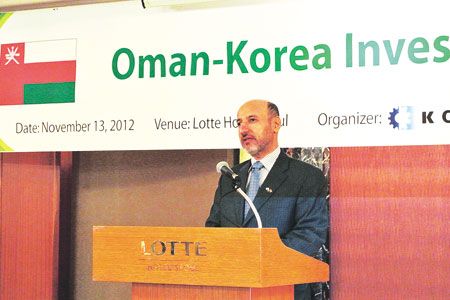Oman invites Korea for abalone farming

Abdulmalik A. al-Hinai, an adviser to Oman’s ministry of finance who led the Omani delegation to Korea last week, speaks during an investment seminar held at the Lotte Hotel in Seoul, Wednesday. / Korea Times photo by Kim Se-jeong
Oman is well known for its flourishing oil and gas industries.
Perhaps somewhat unexpectedly, it also has an expanding abalone market, and the Omani government is currently investing in farming of the mollusc along its 1,700-kilometer long coastline.
The interest was clearly expressed last week by an Omani delegation visiting Korea for the third Korea-Oman Joint Committee Meeting.
“We’re interested in fish farming, in particular,” said Abdulmalik A. al-Hinai, an adviser to Oman’s ministry of finance who led the Omani delegation, during an interview with The Korea Times.
The delegation took part in an investment seminar organized by the Korea Chamber of Commerce and Industry. A presentation on the Omani agricultural and fishery sector was on the program, but was cancelled because the planned presenter couldn’t make it to Korea.
Oman is nowhere close to being an active player in the international abalone market.
According to the Korea Abalone Industry Association, China is the biggest abalone exporter, followed by Korea, Australia, South Africa and Chile.
Enormous quantities of abalone are consumed in Asia. It is a delicacy in Korea and sold at relatively high prices.
Choi Young-se, president of the abalone association based in Mokpo, South Jeolla Province, said the association has 4,700 registered fishermen. Most abalone is farmed now, he added, because natural abalone is on the verge of extinction.
Every year, 6,700 tons of abalone is produced, and nearly 1,500 tons are exported.
“Japan has emerged as a good market for us. Japan is a big consumer of abalone, but production there has decreased after the nuclear disaster last year. Product from Korea has a comparative advantage in terms of price,” Choi said.
Locally produced abalone is more expensive than imported molluscs used by restaurants such as Bonjuk, which specializes in rice porridge and mostly relies on imports of South African abalone.
About the prospects of investment or transferring farming knowledge, the president was rather skeptical saying that fishermen are now more concerned about protecting their expertise.
Gas and oil dominate Korea-Oman relations. Oman is Korea’s third largest supplier of gas, sending shipments amounting to 4.5 million tons last year. The amount of oil shipped to Korea last year was 17 million barrels, the 10th largest oil supplier.
The oil revenue provides Omani citizens with a comfortable life including free education and free medical care. A Korean businessman who has been living in Oman for almost eight years said the redistribution of national oil wealth is a big contributing factor to political stability in the country.
However, as the head of the delegation has indicated, concerns are rising among the leader regarding Oman’s future amidst depleting oil and gas reserves.
“The government began to look into the possibility of renewable energy,” al-Hinai said, and encouraged Koreans to look into it as a possible investment opportunity.
In 2008, the Authority for Electricity Regulation commissioned a study on renewable energy resources. The findings showed that Oman has ‘significant’ potential in solar and wind energy generation. The Public Authority for Electricity and Water is currently implementing solar and wind energy projects. <The Korea Times/Kim Se-jeong>


























































